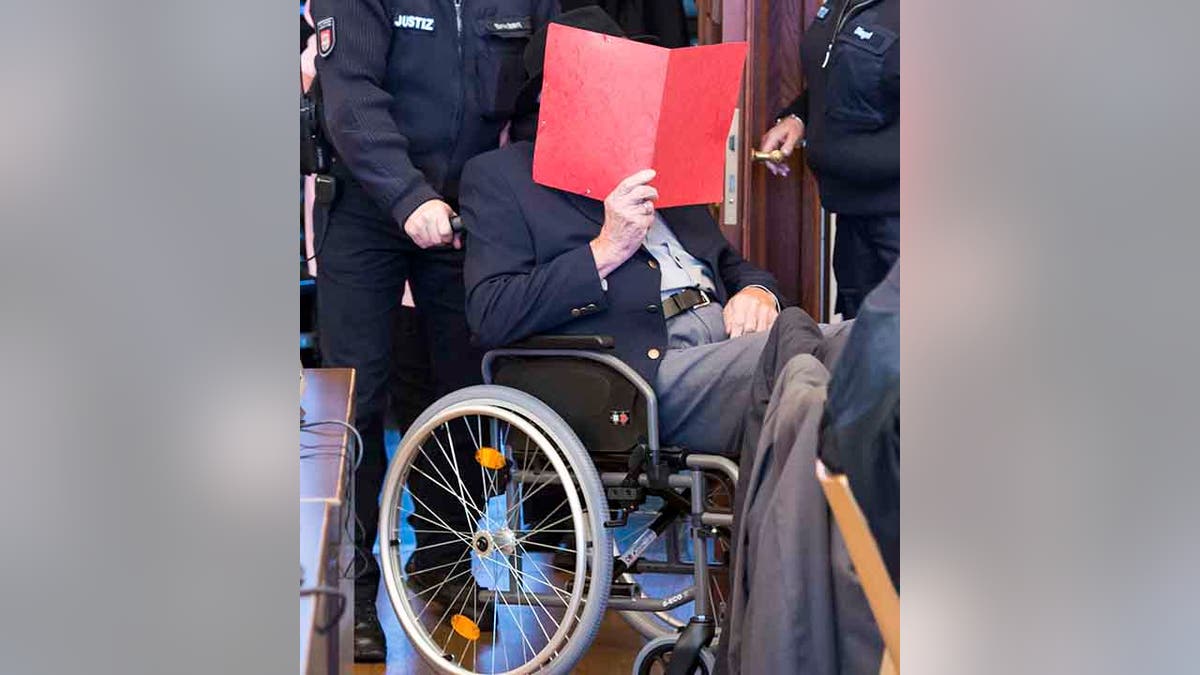Fox News Flash top headlines for Oct. 18
Fox News Flash top headlines for Oct. 18 are here. Check out what's clicking on Foxnews.com
A 93-year-old former SS private, who as a teenager stood guard in a watchtower in a Nazi Germany concentration camp, began trial Thursday in Hamburg state court where he’s accused of being an accessory to 5,230 murders in the finals months of World War II.
Bruno Dey was in his late teens when he worked at the Stutthof concentration camp more than seven decades ago outside of Danzig, which is now the city of Gdansk in Poland.
FORMER SS GUARD TESTIFIES HE WAS AWARE OF CAMP CONDITIONS
Prosecutors argue that while Dey was not directly involved in a killing in Stutthof, he was a "small wheel in the machinery of murder" committed during his time as a guard from August 1944 to April 1945 given he actively stopped inmates from escaping the camp, which was one of the last to be liberated.
Dey also allegedly told investigators he could hear the screams of Jews dying in the gas chambers below his watchtower and witnessed the daily carting off of their dead bodies to the camp’s crematorium. His attorney, Stefan Waterkamp, questioned why his client was being prosecuted now, saying that before a recent change in German legal reasoning, "nobody was interested in the simple guards."
"Where does responsibility end?" he asked the court in his opening statement. "That is the question this trial must answer."

93-year-old former SS guard Bruno Dey in the concentration camp Stutthof near Danzig entering the regional court in Hamburg, Germany, Oct.17, 2019. The prosecution accuses him of aiding and abetting the murder of 5230 people. (Daniel Bockwoldt/dpa via AP)
In recent years, prosecutors have successfully convicted former death camp guards using the argument that by helping to operate camps like Auschwitz and Sobibor, they were accessories to the murders there. The 2015 conviction of former Auschwitz guard Oskar Groening on such reasoning was upheld by a German federal court, solidifying the precedent.
Prosecutor Lars Mahnke detailed how tens of thousands of people, mostly Jews, were gassed, shot and starved to death as part of the "systematic killing" carried out during Stutthof’s six years of operation. Stutthof was established by Nazi Germany in 1939 east of Danzig and was used as the main collection point for Jews and non-Jewish Poles removed from the city. In Dey's case, the reasoning is being applied to a concentration camp rather than a death camp given the site's sole purpose wasn't murder.
"The accused was no ardent worshipper of Nazi ideology," prosecutors argue in the indictment. "But there is also no doubt that he never actively challenged the persecutions of the Nazi regime."
Even in concentration camps, "it was almost a certain death sentence," said Efraim Zuroff, the head Nazi hunter at the Simon Wiesenthal Center in Jerusalem who attended the opening of the trial. Zuroff, who helped locate nearly two dozen Stutthof survivors for the case, rejected Waterkamp's suggestion that Dey should not be prosecuted because higher-ranking Nazis were never brought to trial.
"Just because more senior criminals got away with a crime doesn't mean that the more minor criminals are not guilty," Zuroff said.
CLICK HERE FOR THE ALL-NEW FOXBUSINESS.COM
Because Dey was 17 when he started serving at the camp, he is being tried in juvenile court and faces a possible six months to 10 years in prison if convicted. Dey himself told prosecutors his SS comrades talked of the "extermination of the Jews" and said he had "done people wrong" by serving there.
"I did not know why they were there," Dey told prosecutors. "I knew well that they were Jews who had committed no crime, that they were only there because they were Jews. And they have the same right to live and to work like any other person. But it was just that Hitler or his party ... had something against the Jews."
The Associated press contributed to this report.









































